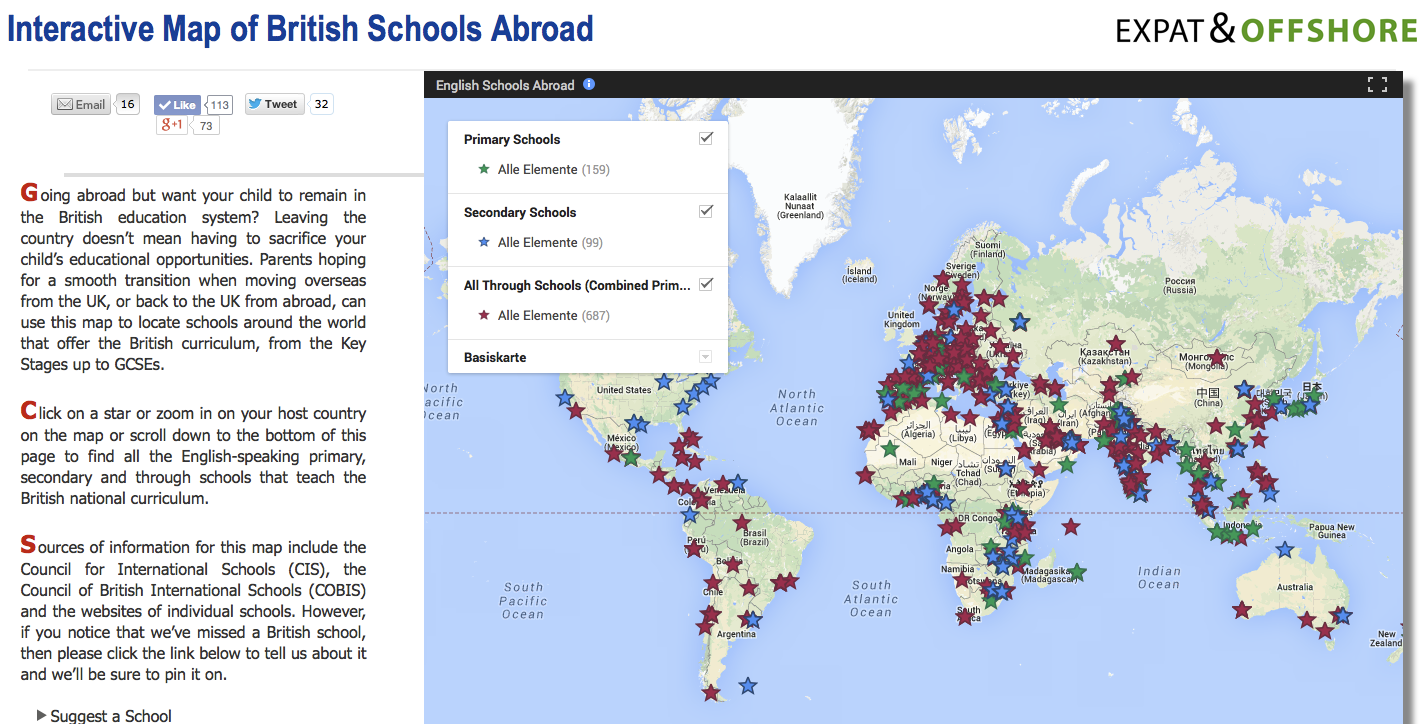A few weeks ago I found a very useful map about British Schools Abroad and shared it on social media. I’m now glad to publish Luke Rees’ very insightful post about it here.
***
Parents who are planning to move abroad face a number of initial challenges. To start with there are the stresses that go along with finding a house, setting up a bank account, buying a car and sorting out healthcare. However there is perhaps nothing quite as tricky as setting your children up in a new foreign school.
Emigrating with children often stirs up a variety of feelings within the family. On the one hand there is the excitement of a new climate, a new culture and a whole new land of opportunities, but on the other there is the fear of change – the stresses of which can wreak havoc on a family. It therefore always pays to be prepared, and to ensure the transition is as smooth as possible.
Taking your kids away from their friends and teachers whilst they are still at primary and secondary school is a delicate process. It is well know that young children need stability, and to wrench everything away from under their feet is no doubt going to be traumatic. If the new country speaks a foreign language or uses their own national curriculum then this can make the transition even harder on your child, who has to learn to negotiate an entirely new educational system.
For British parents there is the option to keep their child at a British school no matter where they are in the world. The British curriculum, from the key stages up to the GCSE exams, are taught in over 1,000 schools around the world. Cambridge IGCSEs are also taught in many schools, which are the international equivalent of GCSEs and accepted by all higher institutions in the UK.
In order to help parents locate British schools an interactive map was created by Expat & Offshore – an online information resource for expats. The map has over 1,000 primary, secondary and through schools to choose from all over the world. In order to find a school in your host country, click on a star and you will find information on the school’s address, website, phone number, and student population. You can view the map here:
Setting your children up in a school where they feel at ease and have the same educational opportunities as back home is everything a parent could hope for, however there are a number of extra strategies to ensure your child’s move is as tear-free as possible.
If your child is particularly sensitive then you must give them lots of time to get used to the idea of moving. Reading books and researching the new country with your children can help them to build an impression before they arrive so that it doesn’t seem so foreign on arrival. Also getting friends and family to put together something to remember them by before you leave – something like a signed T-shirt or a photo album – gives your child time to let go of their home whilst also allowing them to still feel connected to friends after the move.
Some tips to help your child settle into school even quicker include speaking to their new teachers and informing them of your child’s likes and dislikes, as well as giving them the names of important people in their life. Teachers can then reference these people and make your child feel like they’re still at home.

Moving country is one of the biggest steps a family with young children can take and so it always pays to extensively research your country of destination before the move. There are British schools in almost every country in the world (barring a few in Africa), so parents are likely to find an appropriate school no matter where they are.

Luke Rees
Luke Rees is a travel writer from London who currently writes on behalf of Expat & Offshore.
Categories: English, Expat Life, Raising TCK's, School, TCK's






It’s funny because I always wondered if my parents went through any of these when they moved to japan. I think they did consider schools and education. But funnily enough their initial plan about putting us in a French school in Tokyo failed as it was full! So instead they had to put us in the English school. And from that point onwards they just kept us in English speaking international schools ! I guess that’s what’s hard about being an expat, things don’t always go to plan. And it’s much harder to stick to a plan when abroad! Great post!
Thanks for your comment, Olivia. I think one of the most difficult things to learn while living abroad is to be flexible in every circumstance. Making plans makes us feel secure, but having a plan B (and C…) helps internationally living families to adapt better to this kind of life.
I’d even say that most of the things don’t go to plan, at least not the plan we made before moving to one new place. But, in my very personal opinion, this is what makes our lives so fascinating and exciting.
Of course, when it comes choosing a school, internationally living families would love their children to stay in one system and at the moment, the English schools or International schools are the ones you can find all over the world.
Great post Luke! You definitely captured most of the initial feelings for parents with young children. More than anything, becoming an expat yourself is a hard decision with a lot of preparation needed. However, emigrating with children is another worry as it required the double amount of preparation. Out of all things for parents, the school by which your children will be studying at is an uncontrollable emotion as you only want the move to have the best effect! School is such an important factor for expats that it can completely adapt your change in location. Thanks!